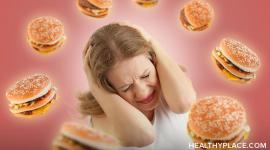Effects of Binge Eating Disorder on Compulsive Overeaters

The effects of binge eating disorder are seen in many aspects of the life of compulsive overeaters. Worse, binge eating disorder often leads to obesity which, in itself, can come with dire consequences. With compulsive binge eating, the stomach is abnormally stretched to hold all the food consumed. During binges, these foods are usually low in protein and nutrients leading to nutritional deficiencies in the compulsive overeaters.
Many Compulsive Overeaters Are Lonely
Because compulsive overeaters often suffer from depression and low self-esteem, they may have fewer friends and possibly retreat from their existing social circle. Compulsive overeaters also generally binge in secret, adding to a desire for isolation. Finally, compulsive binge eating is a mental illness similar to addiction and so compulsive overeaters will often choose bingeing over other things such as friends, family, work or school.
Psychological Effects of Binge Eating
Compulsive binge eating is often brought on and sustained by psychological stress and other problems. Unfortunately, the effect of binge eating itself may lead to additional psychological problems or make the existing ones worse.
Half of the compulsive overeaters have a history of depression, but science isn't sure whether depression is a cause of compulsive binge eating or whether compulsive binge eating causes depression. It is likely a two-way relationship. The effects of binge eating can include shame, disgust, anxiety, obesity and other factors that may make the binge eater feel bad about themselves and worsen their depression. For compulsive overeaters, this may even lead to suicidal thoughts.
Additional psychological effects of binge eating include:
- Greater feelings of stress
- Insomnia
- Substance abuse issues
Dangerous Physical Effects Facing Compulsive Overeaters
Over time, compulsive binge eating generally leads to obesity. Obesity is associated with a host of medical issues and the greater a person's body mass index (a measure of body fat based on height and weight), the greater the risk of medical complications. For compulsive overeaters, these complications can include conditions leading to death.
Obesity-related health problems facing compulsive overeaters include:vii
- Type 2 diabetes
- Gallbladder disease
- High cholesterol
- High blood pressure
- Heart disease
- Certain types of cancer
- Osteoarthritis
- Joint and muscle pain
- Gastrointestinal problems
- Sleep apnea
- Shortness of breath
- Menstrual problems
- Decreased mobility and tiredness
Moreover, obesity often makes exercising more difficult, both physically and possibly psychologically, due to the compulsive overeater's negative emotions about their body image. A lack of exercise increases the likelihood of serious medical problems accompanying binge eating.
Other physical effects of binge eating disorder include:1,2,3
- Nutritional deficiencies
- Electrolyte imbalance
- Headaches
APA Reference
Tracy, N.
(2022, January 4). Effects of Binge Eating Disorder on Compulsive Overeaters, HealthyPlace. Retrieved
on 2025, November 29 from https://www.healthyplace.com/eating-disorders/binge-eating-disorder/effects-of-binge-eating-disorder-on-compulsive-overeaters



